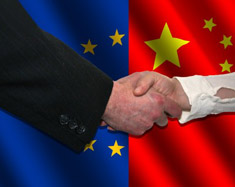Is English still the language of business? There is no simple answer to this question, but there is also no doubt that China is investing more and more outside its borders, including the European continent. Companies and governments around the world with no significant economic ties to China in the last decade of the twentieth century are now trading with this giant, some of them heavily. How then are these countries doing business with China? Is it in English, the so-called “language of business”? Or is it through language services? If the latter is the case, who has adapted to whom? Are Chinese entrepreneurs learning other languages or are people in other countries learning Chinese? Are language service providers (LSPs) translating more from Chinese into European languages or vice versa?
It’s the economy, liebe Freunde
Just 20 years ago, trade between China and Europe was sporadic and statistically insignificant. In the first half of 2009, the European Union (EU) was China’s largest trading partner with a volume of US$224.69 billion, surpassing the United States. China is also the largest recipient of EU exports. Even though China’s accelerated economic presence in Europe and emerging economies has been dubbed by some as opportunistic, the fact is that China has seen continued and explosive growth throughout most of the past decade — averaging a 10% gross domestic product expansion while the economies of Europe, the United States and most of the world were contracting. Global recession was on the horizon in 2007, and Chinese entrepreneurs saw an opportunity to invest in and outright acquire companies in multiple verticals around the world, many on the verge of ...
Read more after login
tekom members can log in directly with their "My tekom" access data.
You are not yet a tekom member, but would like to read one or more articles in full? Then you have the opportunity to register on the internet portal of the technical journal 'tcworld' without obligation. Once you have registered, you can select any three specialist articles and view them in full for a period of two months. The selection will then be deleted and you can select three new articles for the next two months.
As a tekom member you benefit from the following advantages::
- Online access to all articles of the trade magazine 'tcworld magazine'
- Exclusive specialist articles from all areas of technical communication
- Regular new articles from over 300 authors
- The technical journal 'tcworld magazine' as a printed edition
- Reduced admission prices to tekom conferences
- Membership fees for tekom publications
- Access to 'my tekom', the web forum with job offers / job requests, appointments, expert advice, service provider file and much more
Login
Registration
Promised: The trade magazine 'tcworld magazine' is the best we have. And we don't make the choice easy for ourselves. Every month, the editorial staff of the technical journal 'tcworld magazine' publishes the latest articles by renowned authors. This demanding selection is available exclusively to members of tekom (as usual, including the printed edition).
The trade magazine 'tcworld magazine' stands for intelligently prepared specialist articles, texts written to the point, informative content, surprising insights, international perspectives and communicates technical communication in an understandable, fast, clear and uncomplicated way - exclusively for you.

